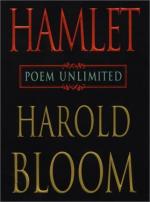|
This section contains 8,522 words (approx. 29 pages at 300 words per page) |

|
SOURCE: "The Revisionary Company: Harold Bloom's 'Last Romanticism'," in New Literary History, Vol. 23, No. 2, Spring, 1992, pp. 361-824.
In the following essay, Altevers argues that Bloom's "psychopoetic model" does not constitute "a fundamentally historical mode of interpretation."
My sense of Harold Bloom's critical importance would not alone seem enough to justify this essay since others have explicated the essentials of his revisionary poetics at substantial length—Frank Lentricchia's After the New Criticism (1980), Elizabeth Bruss's Beautiful Theories (1982), and Jean-Pierre Mileur's Literary Revisionism and the Burden of Modernity (1985) are three examples that come immediately to mind. Despite their strength in other ways, however, these efforts seem to me finally to lack any real understanding of Bloom's project, any sense of its underlying significance. The same, I believe, can be said of certain influential forms of feminist criticism (most famously that of Sandra Gilbert and Susan Gubar) which would posit against Bloom's...
|
This section contains 8,522 words (approx. 29 pages at 300 words per page) |

|


